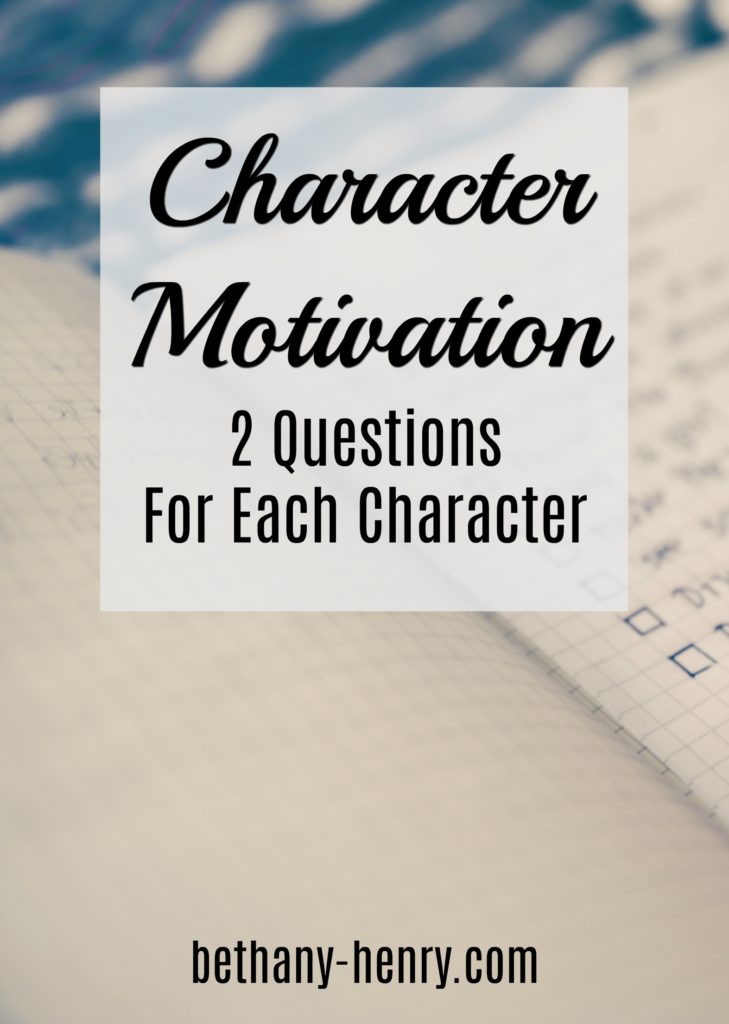Why worry about character motivation?
Our characters are critical to bringing our story to life and in keeping readers engaged. Which means we need characters that are real, that entertain, and that aren’t shallow.
We don’t want our characters to just be pretty good, we want great.
To create great characters we need to dig deeper than hair color and surface questions. Character motivation is the key here.
And no, their motivation can’t just be to fulfill our plot needs and to do what we tell them. That makes for an easier job for us as the writer but a frustrating read for anyone else.
Every single character in our story should want something.
Even if they just want things to stay the same, that’s still a motive. What a character wants will influence their actions, what they say, and ultimately the shape of our story and plot.

2 Questions to Ask For Each Character
1. What does this character want?
What are their dreams, goals, and plans? What do they want in the next five minutes? What do they want in the future?
Kurt Vonnegut famously said, “Every character should want something, even if it is only a glass of water.”
What a character wants (big or small) will drive their actions.
Some people want respect or love. Others want power, money, freedom, or their own bookstore. There are as many answers to this question as there are people in the universe.
Obviously our hero and villain will get the most development of their motivations, but each character who shows up in our story should have a reason for being there.
2. Why do they want what they want?
This is where things get even more interesting.
After all, two different characters could each want the same thing but for different reasons.
Does the character want a cup of water because they’re thirsty or because they want to dump the water over someone’s head?
Perhaps a character wants power so that they can better defend their family. Maybe they want to own a successful business so they can prove to their ex that they aren’t a loser.
The more we ask “why,” the more we dig deeper into what drives our characters.
Surface “wants” may change throughout a story but the deeper reasons of why the character wanted it may remain. This points to core motives such as a desire for love, belonging, justice, or power.
Once we understand a character’s inner desires and values, we can enable them to make realistic choices and actions in our story no matter what the situation.

Each character is complex and sometimes seemingly contradictory. Yet when we look closer we can see the values that drive each of them forward.
Important note:
Some of the lines between good and bad can be blurred here. All desires and motives for our “good guys” do not need to be “good,” nor do our “bad guys” need to have “bad” motives.
Life is rarely that simple.
Heroes may struggle with selfishness and pride. And the villians that are the scariest are often the ones who believe they are doing the right thing.
For further reading on character motivation and development, check out these articles on character arcs or my pinterest character board.
Digging deeper into our character’s motivations will enable us to create characters that are active rather than passive and who will resonate with our readers. Each scene should be driven by the wants of our characters and hindered by the goals of others.
And by developing our characters’ motivations, we’ll eliminate shallow “so-so” characters that are easily forgotten.
May all your characters cooperate with you today! 😉 Happy writing!





My spouse and I absolutely love your blog and find almost all of your post’s to be just what I’m
looking for. Would you offer guest writers to write content for yourself?
I wouldn’t mind writing a post or elaborating on many of
the subjects you write in relation to here.
Again, awesome web site!
You can check out my guest posting info and send me a note through the contact form if you’re interested!